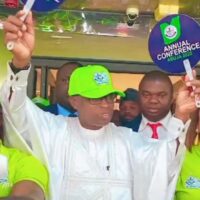Tony Nyiam: Roots of systemic corruption in Nigeria
Tony Nyiam: Roots of systemic corruption in Nigeria
Friday, July 15, 2016 6:29 pm
SCHOOLS EXAMS AND NATIONAL ELECTION MALPRACTICES CONNECTION
Take for example, the institutionalised examination malpractices in many Nigerian educational institutions. What’s more discouraging is that the examination cheating goes on even at the foundation level of the Nigerians children education. This is observable during for example, the common entrance exams into Federal Government secondary schools. Anyone blessed with the discerning ability to make the necessary linkages would have seen that many Nigerian leaders have not the moral right to fight the war against corruption involving Nigerian children examinations cheating. This has been so for over three decades. This is because, as has been well rendered, “he who comes to equity must do so with clean hands”. What do you expect from school kids whose (public officers) role models lack integrity? Over seventy per cent (70%) of Nigerian political elected officials got to their position through electoral malpractices.
The makers of the constitution went further to make almost impossible to be amended. The cabal of internal colonisers did indeed ensured that the Nigerian people will never have a say in its making or amendment. This was rubber stamped when they were allowed to exclude from the constitution any provision for referendum.
Many of the consequent challenges which the Nigerian nation-building is facing, are as a result of the Federal Government disobedience of two of the biblical Ten Commandments. The problems confronting the Nigerian State are due to the disobedience of the commandments that: “Thou shall not steal” and “Thou shall not covet thy neighbour’s house… nor anything that is thy neighbour’s” (Exodus 20:15-17). What the Nigerian State is today reaping is what its former rogue military leadership had sown.
Hence I am humbly advising (as I have in other forays pleaded) that PMB’s Agenda of Change is likely to end up as a temporal panacea, if the envisaged transformation does not extend to constitutional reforms. There is a clear strategic necessity for PMB to go beyond the superficial ‘leaves-like’ changes to the more strategic root and trunk of the tree of the Nigerian systemic corruption.
THE NECESSITY FOR TACKLING CORRUPTION
TO IT’S ROOT CAUSE
There is a clear strategic necessity for the operationalisation of the Change Agenda to go deeper, go beyond the superficial. A superficial change of the outer most sheath of the many layers would not be sufficient. The arrests and convictions of corrupt public officials necessary as it is, are no more than the changes of the leaves of a tree. Just as how leaves come and go, public officials-be them the Chief Executive or the public servants-come and go too.
The President needs to go beyond the superficial (leaves-like) changes to the trunk of the tree which supports the branches that carry the twigs and leaves. The ‘trunk’ here represents both the public and private institutions. We cannot begin an impactful resolution of the recurring national problems, without a restructuring of the institutions whose failures are responsible for the persistence of the challenges.
And for a worthwhile reformation of public institutions, PMB cannot avoid climbing down and indeed, digging deep to the root of the tree of the Nigerian systemic corruption. The root-cause of the institutionalisation of corruption in Nigeria, like the root-causes of other recurring challenges we face as a nation, is traceable to the fraudulent nature of the 1999 Constitution. I humbly so suggest. The rational for this, is that it is the 1999 Constitution which has been defining and determining the processes and associated institutions, and in turn the practices, of governance of Nigeria which have worsened the social, political and economic situation of most Nigerians.
Tony Nyiam is a retired Nigerian Army Colonel


 2 hours ago
2 hours ago  3 hours ago
3 hours ago  5 hours ago
5 hours ago  7 hours ago
7 hours ago  9 hours ago
9 hours ago  9 hours ago
9 hours ago  11 hours ago
11 hours ago  11 hours ago
11 hours ago
Join The Conversation